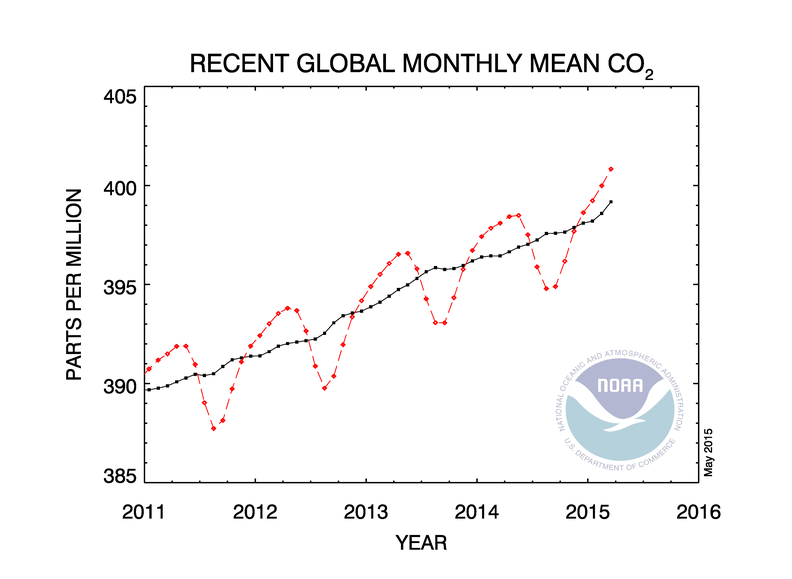General Discussion
Related: Editorials & Other Articles, Issue Forums, Alliance Forums, Region ForumsWe're now at 400.
#CLIMATE NEWS: Global #CO2 concentrations surpass 400 ppm for 1st month since records began http://t.co/7OnX817g3K (MoJones)— NOAA (@NOAA) May 6, 2015

The monthly global average concentration of carbon dioxide just broke 400 parts per million for the first time since record-keeping of greenhouse gas levels began (Wednesday).
"It was only a matter of time that we would average 400 parts per million globally," said NOAA scientist Pieter Tans in a press release. "We first reported 400 ppm when all of our Arctic sites reached that value in the spring of 2012. In 2013 the record at NOAA's Mauna Loa Observatory first crossed the 400 ppm threshold. Reaching 400 parts per million as a global average is a significant milestone."
Crossing the 400 ppm threshold is equal parts disheartening and alarming. Less than a decade ago scientists and environmental activists, including Bill McKibben, launched a campaign to convince policy makers that global CO2 concentrations needed to be reduced to 350 ppm in order to avoid massive impacts from global warming. McKibben, who co-founded the group 350.org, explained the significance of that figure in a 2008 Mother Jones article entitled "The Most Important Number on Earth":
And so we're now in the land of tipping points. We know that we've passed some of them—Arctic sea ice is melting, and so is the permafrost that guards those carbon stores. But the logic of Hansen's paper was clear. Above 350, we are at constant risk of crossing other, even worse, thresholds, the ones that govern the reliability of monsoons, the availability of water from alpine glaciers, the acidification of the ocean, and, perhaps most spectacularly, the very level of the seas.
It's not clear if a vocal world citizenry will be enough to beat inertia and vested interest. If 350 emerges as the clear bar for success or failure, then the odds of the international community taking effective action increase, though the odds are still long. Still, these are the lines it is our turn to speak. To be human in 2008 is to rise in defense of the planet we have known and the civilization it has spawned.
We're now at 400.
herding cats
(19,559 posts)People are either in denial or just don't really care.
Fred Sanders
(23,946 posts)only because a money hungry media lends them credibility.
America needs a political sea change before the sea changes...Viva NDP newly socialist governed Alberta!
I think climate change is the crucible on which all extremist right wing science denial and political denial will be destroyed, because if hell just froze over in Alberta, it can freeze over anywhere.
herding cats
(19,559 posts)Most are in it for the money they get, but some actually believe the crazy things they say.
Spider Jerusalem
(21,786 posts)humans and other species? Well, there've been mass extinction events before; life will survive, humanity may not.
herding cats
(19,559 posts)I admit to being a bit upset by losing our place on the planet. Even if some seem unfazed by it.
GoneFishin
(5,217 posts)from a higher power, you still have to wonder:
If we are so goddamned smart how come we are killing ourselves?
jtuck004
(15,882 posts)ever did.
We might actually get rid of the whole thing this time.
Warren Stupidity
(48,181 posts)Our global elites have decided a massive die off is best.